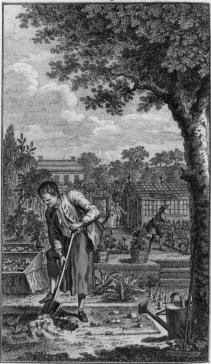This project examined how eighteenth-century imperatives to follow nature actually operated in practice. By considering processes not susceptible to quantification but that signaled a mastery of nature, the historian has to think more about eighteenth-century attitudes and ways of doing things rather than systematic bodies of knowledge or specific theoretical borrowings. A series of natural objects that can also be considered as artificial and, at times, even unnatural provides a window on to these attitudes. This approach promises ways to tap the voices of those rarely considered in connection with debates concerning natural knowledge, luxury, display, and consumption, as early research on the cucumber, considered to be “unnaturally cultivated” in eighteenth-century Britain, has begun to reveal.

Frontispiece of Thomas Mawe [John Abercrombie], Every man his own gardener, 2d ed. (London, 1767).
Project
(2005-2008)
